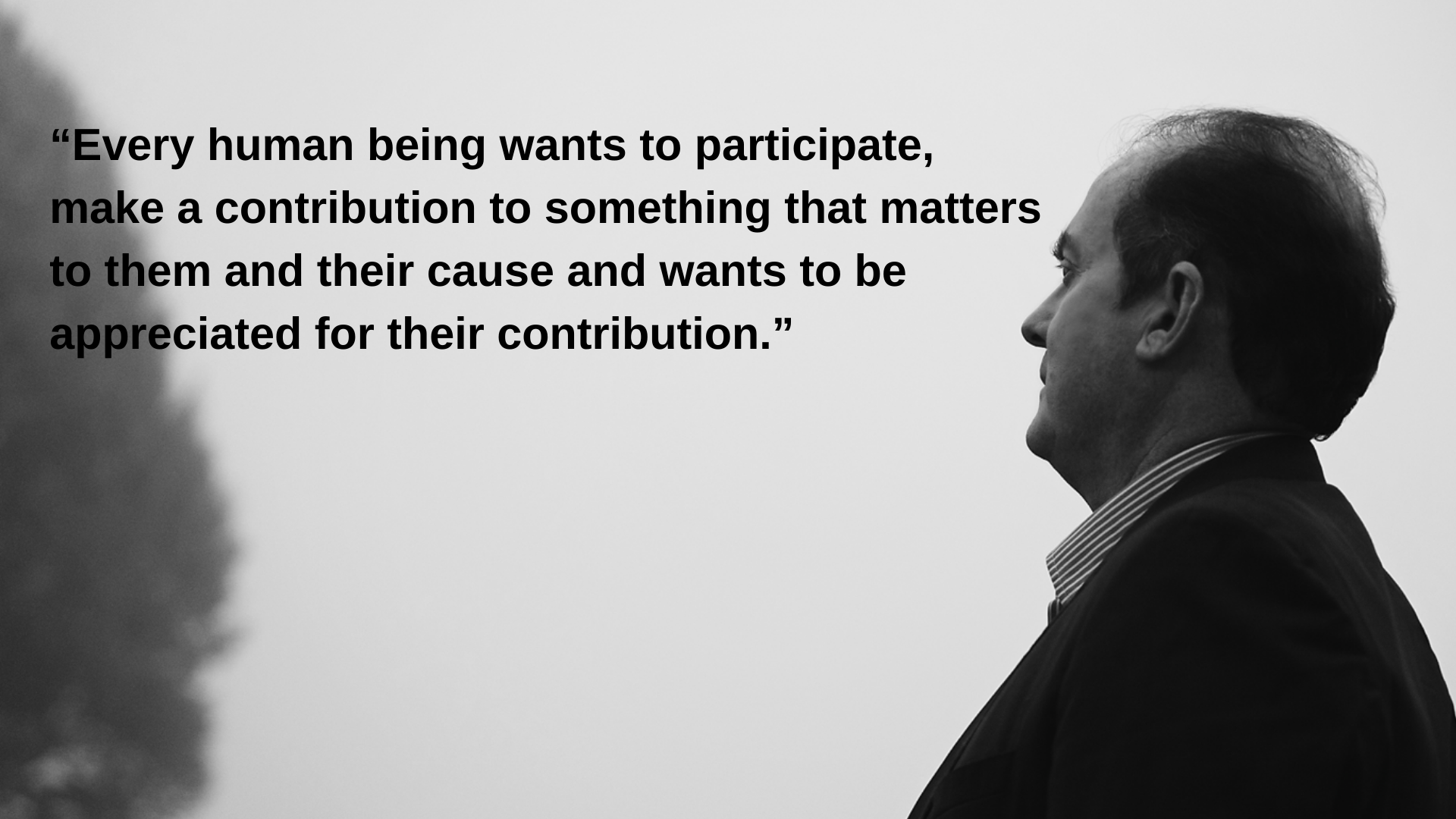The Natural Law Of People

Everybody has a default way of behaving that we will always adopt... until we don't!
Every species has a natural way of behaving and interacting with the world around it. We humans are no different. Humans, however, are exposed to pervasive external pressures that tell us what to do, think, believe, and how to act. We have forgotten the Natural Law of People.
In their natural state, people feel most fulfilled when they can participate with others and contribute to someone or something they care about, knowing that their contribution is making a positive difference and they are appreciated for it.
That is the Natural Law of People, just like the law of gravity. You cannot avoid it!
And yes, there are occasions when we choose to make contributions that do not give us the same feeling of fulfilment and joy - at a cost.
Many people at work today are expected to contribute, and their reward is ever-increasing payment. However, this kind of reward is short-lived and easily copied by a competitor.
If you want to attract and retain hardworking contributors, then you have to understand how to create the conditions that support the Natural Law of People.
The only time when people fully participate and contribute to something is when THEY care about it, and they are appreciated for their contribution. That is when their work becomes a worthwhile experience.
At that point, you know your business is leveraging the Natural Law of People.
That is when true community emerges in an organisation.
To find out more book a free 30 minute Introduction CallThree Things Successful Business Leaders Do
In 2010, Adrian was working on a paper called The Human Condition. His research revealed a phenomenon he called the Natural Law of People.
He observed that in times of crisis, people want to pull together to do whatever they can to help. The crisis calls to people's natural desire to contribute, and in the moment of crisis, they set aside grievances or personal inhibitions. However, when individuals doubt the validity of the crisis, they tend to hold back. Something warns them that it is not valid, and they withhold their contribution.
People who volunteer for organisations, charities or community projects for no pay because they are given the opportunity to make a contribution, and they are contributing to something that they care about, a cause that matters to them.
There are times when people stop contributing.
In times of crisis, this normally happens when professionals, either NGOs or government officials, have a particular way of operating. The people that came to the scene originally, drift away as this new way of operating obstructs their contribution.
This is not an intentional outcome created by the official responders; it is just that their systems and procedures create conditions that inhibit many of the volunteers from continuing to contribute.
As volunteers, they self-organised, contributed what they could do best, and collaborated with each other because they all shared the same relationship to the crisis. They wanted to help.
When the professionals arrived on the scene with their systems and procedures, the volunteers had no connections to these new people. Because there was no connection, they withdrew and stood back.
This can be easily remedied by intentionally establishing relationships with those first volunteers and creating the conditions for them to continue their contribution.
Adrian’s conclusion was that all of us have an inherent desire to participate in and contribute to something that matters to us, which we believe will make a difference to something important to us. If our contribution is appreciated, we want to continue to participate, make our contribution, and receive more appreciation. It becomes a virtuous cycle of mutual benefit.
Many of the existing leadership styles and management approaches ignore this fundamental truth about the human condition and ignore it at their cost.
Clean Leadership is the ideal way to honour the Natural Law of People in your organisation, and when this is achieved, work becomes a worthwhile experience for everyone, the leaders included, just as volunteering can be for the volunteer.
At work, in addition to the Natural Law of People being satisfied, people also get paid for their contribution, but their contribution is less in response to their pay and so much more in response to how they are made to feel about their contribution.
How people feel is a direct outcome of their experience of the communication they receive.
Here are the three actions Leaders must take:
Create a 'Social Contract'.
Belonging to a community is a natural state for human beings, and the best communities have clear rules and guidelines to follow.
A Social Contract describes how we should engage socially and binds us under a contract we commit to. If you want your people to participate fully, they need to understand the rules of the game, know they will be treated fairly, and be appreciated for their contribution.
It is important that everyone plays by the same rules!
Create inclusive platforms.
A community is defined by the platform that is exists on. The platforms we mean are platforms created in language. The language you use in your business or organisation describes a space where all of the members can participate, contribute, collaborate and interact in service of a specific future.
If the language is not inclusive, then the platform won't be either.
A business is made up of one main platform that has many smaller platforms within it.
Leaders must go first.
'Do as I do' is the most inspiring way to lead. Be the first to engage positively, encourage dialogue, listen intently and speak from the heart.
Great leaders show the why, the what, and the how so that everyone may follow. Be the leader first. A leader's language and behaviour MUST abide by the same Social Contract that applies to every employee.
Remember, leaders must show the way for others to follow. Always behave the way you expect others to behave.
Build the Right Environment
Every business is unique, not because of its brand, product or service. It is unique because of the people who work in it, the the CEO to the shopfloor. Everyone wants to make their best contributions, so as leaders and managers, your primary internal focus must be creating the environment that enables that.
Diversity, Equity, and Inclusion (DE&I) are values many organisations strive to deliver. They want to support different groups of individuals, including people of different races, ethnicities, religions, abilities, genders, neurodiversities and sexual orientations.
By creating the conditions that support the Natural Law of People, you will rapidly create an environment where D&I will thrive.

The Key to Creating the Right Conditions is Communication!
Communication is so much more than what you say and how you say it. To master the art of communication you must understand the building blacks of communication, how to structure conversations, the rules of dialogue and how to influence how people listen to you.
That's why I created the Leaders Communications Course from the work I have done in organisations.
Learn More

